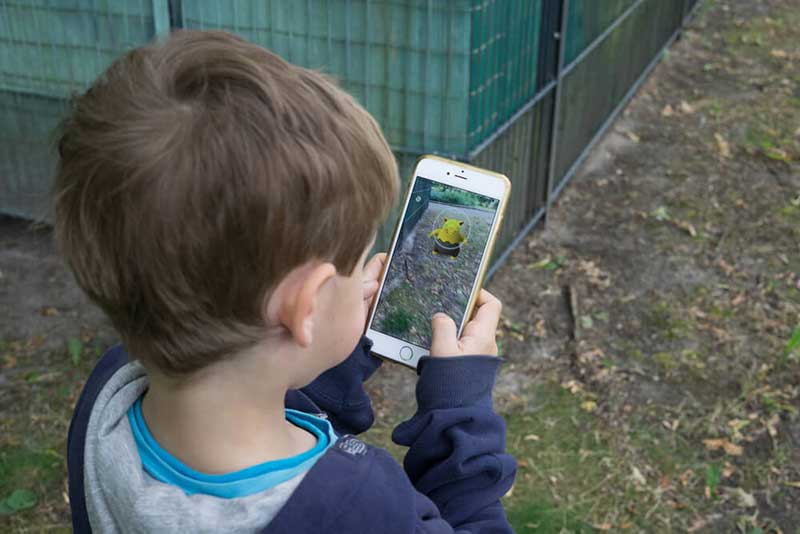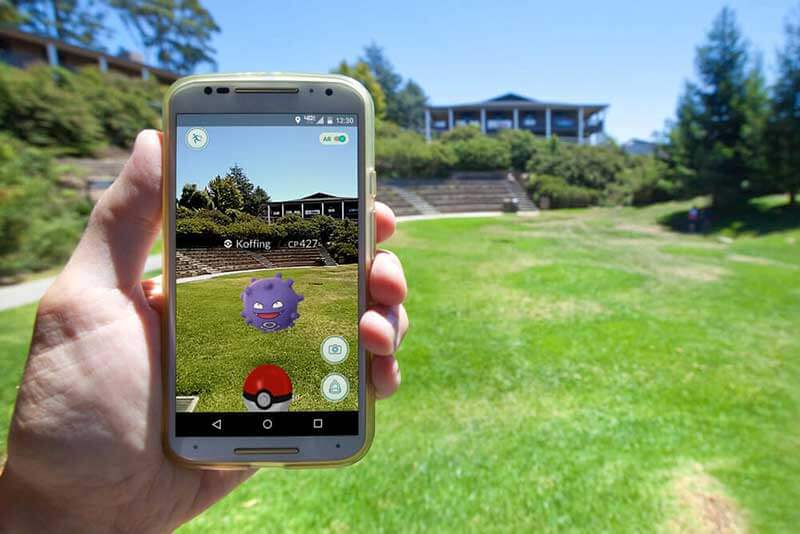- Applauding the game for getting kids moving
- Real world dangers of Pokémon GO
- Personal information embezzlement or carelessness – cybersecurity implications
- Long term implications on society – a philosophical perspective
- Will AR, VR and the real world eventually morph into one new dimension?
- Revolutionising technology by sparking more Pokémon apps
- The good, the bad and the ugly
Pokémon GO was released in selected countries in July of this year and subsequently rolled out in the rest of the world. It went viral the moment it hit the app stores and has become an international phenomenon overnight. The game has sparked a frenzy among players and is making headlines all over the world. It’s the first mass market AR video game that seamlessly blends the digital and real worlds. Players of the game use the GPS on their phones to venture to real world locations in order to catch Pokémon. According to Forbes, the game currently has more daily users than Twitter and you don’t have to be a rocket scientist to see why Nintendo’s stock price has skyrocketed. However, among all the madness and enthusiasm are some concerns around its real social impact, with cybersecurity being one of its most pressing concerns. Read on for Pokémon GO: the good, the bad and the ugly.
Applauding the game for getting kids moving
Among Pokémon GO enthusiasts are large numbers of parents who actually applaud the game as it gets their children to leave their homes and visit real-life places while collecting their anime creatures. They see it as a welcome alternative to the hours and days spent behind computer and phone screens at home. As you need to cover a lot of ground in order to be successful at the game, Pokémon GO really does get you moving. You interact with other people, particularly so when you play at a higher level. There are many groups, forums and meetups, all centred around the game. Many claim the game brings people together in various interesting ways, improving mental health by encouraging socialisation and exercise. Gyms and Pokéstops have become peoples’ new favourite hangouts – when they aren’t in the middle of a highway, falling of a cliff or getting lost in a mine. Pokémon GO may just be revolutionising the world as we know it.

Real world dangers of Pokémon Go
Apart from all the ‘PokéExcitement’, there are already numerous accounts of practical dangers ranging from broken ankles from falling into ditches to people being robbed at gunpoint at Pokémon GO locations. In the UK, four teenagers had to be rescued after getting lost in a mine for over five hours and police in Ireland had to explain to players that spotting a Pokémon was not an excuse to wander around someone’s property or break into someone’s house.
Pokémon GO encourages players to collect items at Pokestops, which enables criminals insight into where players could potentially gather. Other items such as ‘Lures’ can attract more Pokémon to a specific location – which will in turn attract more players. Not only will the game appeal to thieves and robbers; imagine what could happen when paedophiles are able to predict where children will go next – which is possible through geolocating. People are even losing their jobs over this game; a bank recently fired an employee who tried to catch a Zubat Pokémon flying nearby. Then there’s people behaving recklessly in traffic, resulting in serious accidents. Experts warn that the popular app is a potential recipe for disaster, in more ways than one. One of the concerns, perhaps the most significant one, is the implications the game can have on cybersecurity.
Personal information embezzlement or carelessness – cybersecurity implications
The Internet has been abuzz with news articles and blogs about the fact that millions of players may just be handing Niantic – the developer of the game – all their personal details, and not just information about their location, on a silver platter. Almost overnight, with record numbers of aspiring Pokémon trainers signing up, Niantic’s database has become a sought-after destination for criminals, hackers and corporations alike. The game can either be played by registering a Pokémon account or by using your Google account. Through the user’s Gmail account, Pokémon GO allegedly had full access to users’ Google accounts: Gmail, Google Drive and Google Photo, among others. They had permission to read and send email on the users’ behalf as well as control and delete any content on Google Drive, Google Photo, view search history and even find information on Home and Office locations on Google Maps. The application asks for access to the user’s contacts, camera, SD card contents and GPS location. Furthermore, with email being an authentication method for resetting passwords, Niantic was also potentially able to access user accounts on other websites as well.
After the discovery of the security hole, Niantic responded by ensuring that they had fixed the problem and that Pokémon GO now only has access to basic Google profile details such as email address and User ID. Prior to the fix, Niantic insisted that it was only during the account creation process on IOS that the game had mistakenly requested permission for full access to Google accounts. Google has since also verified that they have reduced Pokémon GO’s permission to only access basic profile data and that there is no need for users to take any action. Internet security experts, among which Adam Reeve, have stated that they don’t think Niantic is planning any type of global information embezzlement but at the same time, not much is known about Niantic’s security and privacy policies either.
Absolute security of any information cannot be guaranteed
Credit card fraud – as Pokémon GO also uses in-app transactions – identity theft and hackers selling data of Pokémon catchers to foreign governments or on the black market are all in the realm of possibilities. Niantic has however promised to take appropriate measures to protect its users by increasing cybersecurity measures. Simultaneously, however, their privacy policy reads that they “cannot guarantee the absolute security of any information”. This means that they can still, legally, sell and share personal information with third parties. It considers this information a business asset that can be sold or used for the purpose of performing services, demographic profiling, research and analysis. Not only is the worrying privacy policy an issue for Pokémon GO users, it is also a potential problem for Niantic itself. Not too long ago, they were just a startup which has now been catapulted into the limelight with its immensely lucrative app – and humongous dataset. Niantic now has the ominous task to keep that pool of personal data safe and secure or their customers will be left vulnerable. Reeve said: “Pokémon GO looks like a lot of fun and I wish I could play but there is just no way it’s worth the (cybersecurity) risk.”

Long term implications on society – a philosophical perspective
Augmented reality games are a fascinating phenomenon. They will, and are already having, a significant impact on society. They could also be dividing society into two main groups. Those who are successful have special talents, earn a decent living and have a satisfying social life. They are the ones who most benefit from new technology like, for instance, improved shopping experiences and smart homes. They use Uber and AirBnB and will eventually drive autonomous cars. Then there’s the majority of people – the infrastructure for the successful ones – who are perhaps not very well educated. They are the people who clean our hotel rooms, collect our garbage, wash our cars. They may struggle to pay the rent, even be unemployed. For those, the world may not be such a great place. Their primary entertainment consisting of Facebook, television and games. Fantasy is a great escape from the daily struggle and its lure to those less fortunate will increase. The games will become richer and deeper from an augmented and virtual reality point of view. More and more people will partake in life through these AR and VR filters that enable them to be successful. They will be the hero, reach the highest levels and gain respect from their peers. A better world than the real one. As life gets harder for most people in the world, more people will need this filter on reality and they will increasingly escape into the virtual/augmented world.
Will AR, VR and the real world eventually morph into one new dimension?
While playing AR and VR games, the real world is our canvas. Eventually, we will have completely immersive games, possibly evolving into simulations that are almost impossible to distinguish from reality. Will we turn real live, horrible people into villains and nice, beautiful people into goddesses? Is it possible that our world will eventually evolve in such a way that past, present and future seamlessly blend into one, fourth dimension? Will we be able to see what happened in history at the locations we pass by and witness what is yet to come? This scenario may actually not be too far off.
Revolutionising technology by sparking more Pokémon apps
Coming back to the real world of today, Curtis Silver, Forbes.com contributor and business and marketing analyst writes about how Pokémon GO’s unprecedented popularity may even inspire other tech companies to adapt their technology. Hitching a ride on the Pokémon bandwagon, some potential new apps could – hypothetically speaking- even include PokéGLass, PokéFit, PokéDating and PokéVR. Tongue-in-cheek, of course. Or not?
PokéGlass and the return of Google Glass
Google Glass, it seems, has somewhat disappeared off the augmented reality radar. Described by some as a ‘cool failure’, the AR headsets could see a strong return if re-branded as PokéGlass. Imagine Pokémon GO enthusiasts staring into AR goggles instead of at their phones while wandering around the streets. PokéGlass could provide 360 degrees of augmented bliss, keeping players’ eyes on what’s in front of them instead of at an angle that causes muscle strain. Not only would it be an incredible cool accessory; you could even catch Pokémon by a mere blink of your eye.
PokéFit could be the new norm in fitness tracking
Never mind CrossFit and FitBit and all the other fitness trackers. PokéFit could become the new norm in fitness tracking. Pokémon GO is already causing prior home-bound people to take to the streets in their thousands, catching Pokémon around town. Now imagine a complimentary app tracking all those steps and other vitals wile you catch them all. PokéFit could encourage you to go the extra mile and even include the Pokémon in your activity level. Imagine Pokémon running away instead of sitting still, waiting to be caught. This would really mean upping your game in more ways than one.
Wedding bells with PokéTinder
Imagine really bringing people together, romantically – on the sidewalk or in a park – instead of at a Pokéstop or gym. It will probably just be a matter of time before we see a Tinder-type Pokémon GO app. You could filter down to Yellow team, check out the talent and determine viability. If a potential date only holds a couple of weak Diglets, would you really want to date them? Pokéstops could be transformed into speed dating sites or one could use the app for casual hook-ups. As you can see, there’s lots of potential here for app developers.
PokéVR – catch Pokémon without moving an inch
For those who would rather not move around in real life, a VR version of Pokémon GO would be the perfect solution. They could use PokéDrones, kitted out with VR gear and catch Pokémon without setting a foot outside their door. This would, of course, eliminate some of the attractive features of the game – being outside, socialising and getting some physical exercise. If you want an answer to the question whether AR and VR can co-exist in the gaming market, particularly in Pokémon GO, PokéVR could be the perfect testing ground.
Pokémon GO – the good, the bad and the ugly
Any tech startup would give an arm and a leg to create something more popular than Facebook and the success of Pokémon GO will not be showing signs of abating any time soon. A number of publications assert that we are entering an era of games that cause the boundaries of the real and the digital world to become increasingly blurred. There is no doubt that Pokémon GO is brilliant but seeking digital gratification shouldn’t be an excuse to hurt others or even ourselves. Furthermore, in order to keep sensitive, personal information from falling into the wrong hands, we should not turn a blind eye to the very real and increasingly serious cybersecurity concerns associated with these types of games.
Share via:



